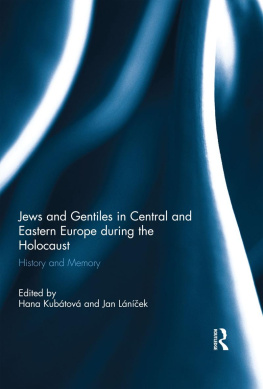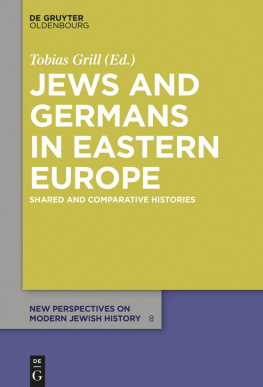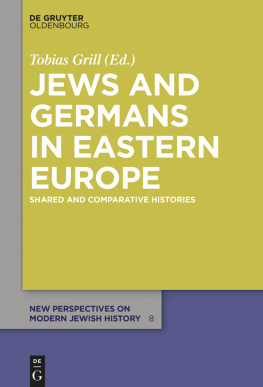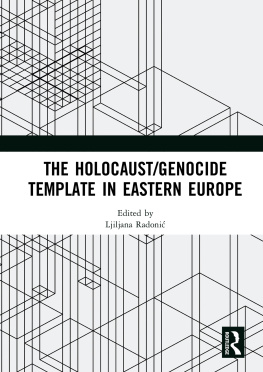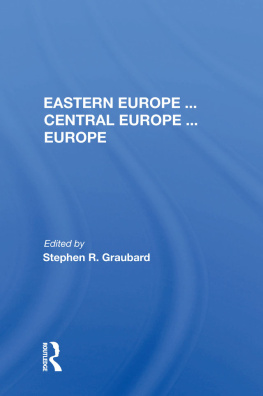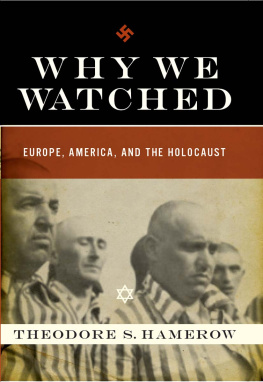Jews and Gentiles in Central and Eastern Europe during the Holocaust
Providing diverse insights into JewishGentile relations in East Central Europe from the outbreak of the Second World War until the reestablishment of civic societies after the fall of Communism in the late 1980s, this volume brings together scholars from various disciplines including history, sociology, political science, cultural studies, film studies and anthropology to investigate the complexity of these relations, and their transformation, from perspectives beyond the traditional approach that deals purely with politics.
This collection thus looks for interactions between the public and private, and what is more, it does so from a still rather rare comparative perspective, both chronological and geographic. It is this interdisciplinary and comparative perspective that enables us to scrutinize the interaction between the individual majority societies and the Jewish minorities in a longer time frame, and hence we are able to revisit complex and manifold encounters between Jews and Gentiles, including but not limited to propaganda, robbery, violence but also help and rescue. In doing so, this collection challenges the representation of these encounters in post-war literature, films, and the historical consciousness.
This book was originally published as a special issue of Holocaust Studies.
Hana Kubtov is an Assistant Professor at the Charles University, Prague, Czech Republic.
Jan Lnek is a Senior Lecturer at the University of New South Wales, Sydney, Australia.
Jews and Gentiles in Central and Eastern Europe during the Holocaust
History and Memory
Edited by
Hana Kubtov and Jan Lnek
First published 2018
by Routledge
2 Park Square, Milton Park, Abingdon, Oxon, OX14 4RN, UK
and by Routledge
711 Third Avenue, New York, NY 10017, USA
Routledge is an imprint of the Taylor & Francis Group, an informa business
2018 Taylor & Francis
All rights reserved. No part of this book may be reprinted or reproduced or utilised in any form or by any electronic, mechanical, or other means, now known or hereafter invented, including photocopying and recording, or in any information storage or retrieval system, without permission in writing from the publishers.
Trademark notice: Product or corporate names may be trademarks or registered trademarks, and are used only for identification and explanation without intent to infringe.
British Library Cataloguing in Publication Data
A catalogue record for this book is available from the British Library
ISBN 13: 978-1-138-06132-3
Typeset in Minion Pro
by RefineCatch Limited, Bungay, Suffolk
Publishers Note
The publisher accepts responsibility for any inconsistencies that may have arisen during the conversion of this book from journal articles to book chapters, namely the possible inclusion of journal terminology.
Disclaimer
Every effort has been made to contact copyright holders for their permission to reprint material in this book. The publishers would be grateful to hear from any copyright holder who is not here acknowledged and will undertake to rectify any errors or omissions in future editions of this book.
Contents
Citation Information
The chapters in this book were originally published in Holocaust Studies, volume 23, issue 12 (FebruaryApril 2017). When citing this material, please use the original page numbering for each article, as follows:
Chapter 1
Jews and Gentiles in Central and Eastern Europe during the Holocaust in history and memory
Hana Kubtov and Jan Lnek
Holocaust Studies, volume 23, issue 12 (FebruaryApril 2017), pp. 116
Chapter 2
Intimate violence: Jewish testimonies on victims and perpetrators in Eastern Galicia
Natalia Aleksiun
Holocaust Studies, volume 23, issue 12 (FebruaryApril 2017), pp. 1733
Chapter 3
Helping, denouncing, and profiteering: a process-oriented approach to JewishGentile relations in occupied Poland from a micro-historical perspective
Agnieszka Wierzcholska
Holocaust Studies, volume 23, issue 12 (FebruaryApril 2017), pp. 3458
Chapter 4
Geographies of obligation and the dissemination of news of the Holocaust
Michael Fleming
Holocaust Studies, volume 23, issue 12 (FebruaryApril 2017), pp. 5975
Chapter 5
Was the antisemitic propaganda a catalyst for tensions in the Slovak-Jewish relations?
Michala Lnkov
Holocaust Studies, volume 23, issue 12 (FebruaryApril 2017), pp. 7698
Chapter 6
Memories of the Holocaust: Slovak bystanders
Monika Vrzgulov
Holocaust Studies, volume 23, issue 12 (FebruaryApril 2017), pp. 99111
Chapter 7
The image of the Jew as an enemy in the propaganda of Late Stalinism and its reflection in the Czechoslovak context
Kateina imov
Holocaust Studies, volume 23, issue 12 (FebruaryApril 2017), pp. 112132
Chapter 8
Abandoned, confiscated, and stolen property: JewishGentile relations in Hungary as reflected in restitution letters
Borbla Klacsmann
Holocaust Studies, volume 23, issue 12 (FebruaryApril 2017), pp. 133148
Chapter 9
The Holocausts in Greece: victim competition in the context of postwar compensation for Nazi persecution
Kateina Krlov
Holocaust Studies, volume 23, issue 12 (FebruaryApril 2017), pp. 149175
Chapter 10
Conceptions of the catastrophe: discourses on the past before the rise of Holocaust memory
Mt Zombory
Holocaust Studies, volume 23, issue 12 (FebruaryApril 2017), pp. 176198
Chapter 11
Lamentations of a shopkeeper for his sluttish daughter? Tadeusz Borowski and His Holocaust Socialist Realism
Pawe Wolski
Holocaust Studies, volume 23, issue 12 (FebruaryApril 2017), pp. 199207
Chapter 12
Nontraditional images of the Holocaust in Czech literature and cinema: comedy and laughter
Ji Hol
Holocaust Studies, volume 23, issue 12 (FebruaryApril 2017), pp. 208221
For any permission-related enquiries please visit: http://www.tandfonline.com/page/help/permissions
Notes on Contributors
Natalia Aleksiun is an Associate Professor of Modern Jewish History at Touro College, Graduate School of Jewish Studies, New York, USA.
Michael Fleming is a Professor of History at the Polish University Abroad, London.
Ji Hol is a Professor of Czech Literature at Charles University, Czech Republic.
Borbla Klacsmann is a doctoral student at the Department of History, University of Szeged, Hungary, and a member of the Hungarian research group, Yad Vashem.
Kateina Krlov is an Assistant Professor in Contemporary History at the Faculty of Social Sciences, Charles University, Czech Republic.
Hana Kubtov is an Assistant Professor at the Faculty of Social Sciences, Charles University, Czech Republic.
Jan Lnek is a Senior Lecturer in Jewish History at the University of New South Wales, Sydney, Australia.

